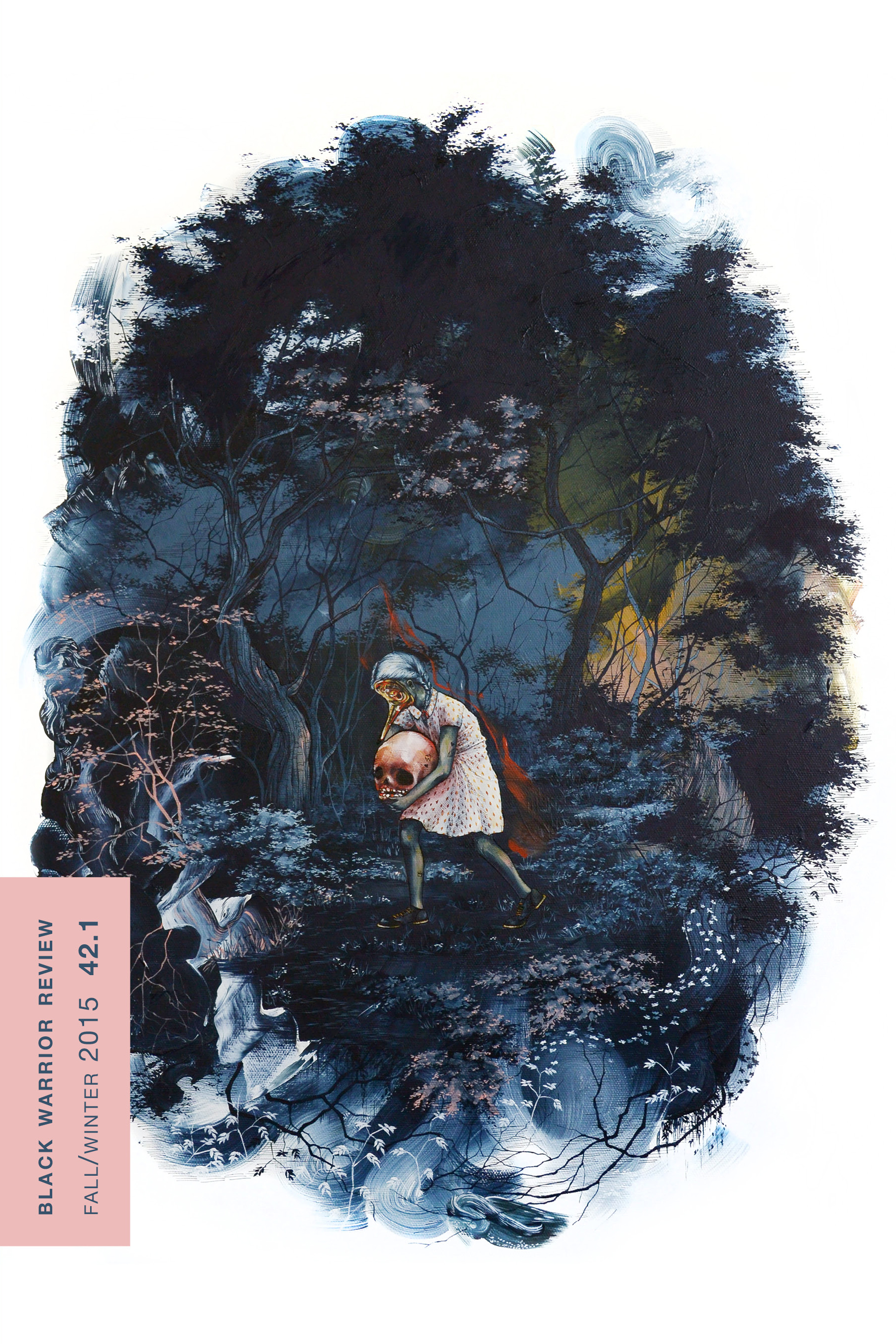42.1 Feature: Craft Essay by Shamala Gallagher

Shamala Gallagher’s chapbook I Learned the Language of Barbs and Sparks No One Spoke is forthcoming this year from dancing girl press. Her poems and essays have appeared in VOLT, Verse Daily, Copper Nickel, RealPoetik, The Offending Adam, LikeStarlings, and elsewhere. Shamala holds an MFA from the Michener Center for Writers and now lives in Athens, Georgia, where she is at work on a book of essays, Mooncalf.
A Craft Essay
by Shamala Gallagher
I don’t believe in “craft,” but I believe in self-frustration—blood-frustration that rattles the edges of the person and rattles its core. I wrote “Mooncalf” in a furiousness at the impossibility of writing it. I wrote in a rage of wanting to write. I grew wasted with despair of ever writing it, and that waste is its only substance.
Perhaps that sounds more myth than truth. But it is close to the truth, and I don’t want to live without myth.
I wonder if this is clear from the essay itself: I began writing the essay, “Mooncalf,” and the book, Mooncalf, at the lowest point in my life. This point proceeded from my own ruin and preceded my ability to live with it. Maybe the entirety of this ruin is not communicable, or its details are mostly laughable, or I live in a world in which ruin is an archaic or unspeakable whim. Likely I have never known ruin and will regret that I once said I did. But in hope that experience has meaning, I will speak my ruin plainly for a handful of sentences.

Two winters ago the snow would start on the tan dead grass in miraculous, precise flecks. I lived in a shut, speechless gray in barely a town in Missouri. It had the name Golden City and was made of one street. I lived there because of a clutch of desire for a man who would not marry me. There was a nearby county jail, where I slept one night, and the night-ink on my palms and fingers as I pressed them against a strange surface so that a print could be made. And before that, when drunk on a long, long country road, the lights like rare red and blue candy as the dark looked absently on.
The subject of Mooncalf is ruin, or shame or failure or poverty or despair, as a subjective state of being and, more tentatively, as a political one. Or its subject is “being mixed-race.” Or the essay asks a question about the skin of the self, whether it is brave and capacious enough to contain any of the world. But its half-buried subject is drunkenness, which, when I started writing the first essay, I had already begun to give up.

I wrote much of “Mooncalf” in a state named No Wine, toward which I was straining for years, and where I reside permanently now. Much of drink glitters in the piece. Though I never wrote while drinking, I wrote it in and out of the thought of drink. It was impossible to write, and senseless. If described it to a friend she looked puzzled. I wrote it each day after waking very early to drive forty miles of not-gold air: to wear an anxious blue button-down and a black skirt and to feign cheerful authority while broke: and then to come home at midday for a ravenous nap. It is my favorite way to sleep: ravenous, mid-afternoon. Then I would wake to have tea, which is its own aching-gold liquor. And to be sober, though wine is sacred. And then write, nonsense-tempted.
(Mooncalf, it would be right to say you have no face or body. What is there, Mooncalf: a looking. I know you have eyes, Mooncalf. Where are they. I want you strange and awake. I always want to stand in a room and turn to its edges. I want them to slip and open—to wrestle what at the brink of asking: I won’t know. This is what kind of escape and what more. I want only nonsense.

Mooncalf, can I write this? I am afraid that my awakeness can translate into no language. That the words that contain my experience stub out. That my eyes scrape with stars and are finally alone. The steep drop off a corner: then what. The eyes that are wakened and no more.)
When I wrote “Mooncalf” I was struggling against nonsense. Does this happen to others? I want to make sense, but nonsense comes on. It presses at the edges of a sentence. Any clarity I ever achieve comes from wrestling with nonsense, and from love of nonsense too.


The nonsense of lyric is a repository for drunkenness in the text. It is not actual drunkenness—not with chemical. It is drunkenness of a deeper kind, which I understand as being close to what I could call god. In the drunkenness of nonsense, I write at the skin of what is happening. It is like the skin that forms on milk.
(What it is like to stand in a room of your thought: it is a hesitant parlor, it is a deep interior cave. Your eyes are not wrong. Without eyes we would have this too, this scratching and saying. I would like to ask _______. The questions spill over for a long time.)
